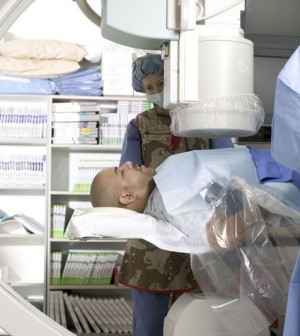- Could Your Grocery Store Meat Be Causing Recurring UTIs?
- Are You Making This Expensive Thermostat Error This Winter?
- Recognizing the Signs of Hypothyroidism
- 10 Strategies to Overcome Insomnia
- Could Artificial Sweeteners Be Aging the Brain Faster?
- Techniques for Soothing Your Nervous System
- Does the Water in Your House Smell Funny? Here’s Why
- Can a Daily Dose of Apple Cider Vinegar Actually Aid Weight Loss?
- 6 Health Beverages That Can Actually Spike Your Blood Sugar
- Treatment Options for Social Anxiety Disorder
Vitamin E, Selenium Don’t Cut Colon Cancer Risk: Study

Taking vitamin E and selenium does not appear to reduce the risk of polyps that can lead to colon cancer, a new study finds.
Researchers analyzed data from more than 6,500 men in the United States and Canada and found that those who took the two antioxidants did not have a lower risk of colon polyps than those who took placebos.
“The message to the public is this: Vitamin E and selenium will not prevent colorectal adenomas, which are surrogates for colorectal cancer,” lead author Dr. Peter Lance said in a news release from SWOG, the cancer clinical trials network funded by the U.S. National Cancer Institute. Lance is deputy director of the University of Arizona Cancer Center.
He and his SWOG team used data from SELECT, a prostate cancer prevention trial that enrolled more than 35,000 healthy men — 21 percent were men of color — from 427 study sites in the United States, Canada and Puerto Rico. The men were randomly placed into four groups: some took a daily dose of vitamin E, others a dose of selenium, others took both antioxidants, and the rest took a placebo only.
The research team reviewed colonoscopy and sigmoidoscopy reports on 6,546 participants and found that nearly 2,300 had more than one colon polyp detected by the procedures. A statistical analysis showed that the occurrence of polyps was about the same among all the men, regardless of supplement intake.
The study was published in the journal Cancer Prevention Research.
Lance led a previous study that found that a daily dose of vitamin E and selenium did not prevent prostate cancer.
“There’s a whole industry that has people dosing themselves thinking that vitamins will keep them healthy. But we have little evidence that they protect against cancer,” Lance said.
More information
The U.S. National Cancer Institute has more on colon cancer.
Source: HealthDay
Copyright © 2026 HealthDay. All rights reserved.










